- Home
- Dante Alighieri
Dante's Lyric Poetry Page 7
Dante's Lyric Poetry Read online
Page 7
In this tenzone both poets are unstinting in their praise, seeming to sublimate aggression through stylized compliments. But aggression is not always sublimated in these exchanges. Unsublimated aggression comes to the surface in a sonnet written by none other than Dante da Maiano, who, in his mocking response to A ciascun’alma presa e gentil core, addresses Dante Alighieri slightingly as “amico meo di poco canoscente [my friend who understands but little]” (Di ciò che stato sè dimandatore, 3). Dante da Maiano further disparages Dante Alighieri as delirious, announcing that he will not alter his interpretation of A ciascun’alma until he has submitted Dante Alighieri’s urine for examination by a medical doctor: “né cangio mai d’esta sentenza mea / finché tua acqua al medico no stendo [nor shall I change my view / till I submit your urine to the doctor]” (Di ciò che stato sè dimandatore, 13–14).
Here we see again the pattern of Provedi, saggio and Savete giudicar: we see the same divergence between Dante da Maiano, the literalist who yet desires to be interpreted (Provedi, saggio, ad esta visïone), and Dante Alighieri, who in his response to Provedi, saggio moves markedly farther away from the literal than the other respondents (Savete giudicar). In a reversal, now it is Dante Alighieri who proposes a mysterious vision (A ciascun’alma) and Dante da Maiano who, as one of three interpreter-respondents, again shows his literalist bent (Di ciò che stato sè dimandatore): he refuses to engage in any interpretation of A ciascun’alma, a sonnet whose vision of Love holding the poet’s sleeping beloved and then awakening her to feed her the poet’s heart apparently is too extreme for Dante da Maiano’s tastes. Cavalcanti, by contrast, interprets Dante’s vision in the key of existential and epistemological fullness and completion: “Vedeste, al mio parere, onne valore / e tutto gioco e quanto bene om sente [You saw, in my opinion, all worth and all happiness and as much good as man feels]” (Vedeste, al mio parere, 1–2).
In these exchanges we can see ideological positions carved out as these rival poets debate not so much the greatest suffering of love but the degree of metaphysical access permitted to love poetry. Dante da Maiano’s reply to A ciascun’alma may well mark the first time that Dante Alighieri is mocked for his spirtualizing tendency – as Guinizzelli was mocked by Bonagiunta, and as Cino da Pistoia will be mocked by Onesto degli Onesti, for this is an ongoing debate in the Italian lyric tradition – but it is not the last. In the sonnet Dante Alleghier, Cecco, tu’ servo amico, Cecco Angiolieri will take Dante Alighieri to task for what he considers a self-contradiction in the sonnet Oltra la spera, engaging in an almost lawyerly parsing of the sonnet, as though he had taken a tip about the value of “quistioneggiare” from Dante da Maiano’s Per pruova di saper. Cecco objects that in one stanza Dante claims not to understand the speech of the thought that followed Beatrice to heaven and that in another he claims to understand it well:
Ch’al mio parer ne l’una muta dice
che non intendi su’ sottil parlare,
di quel che vide la tua Beatrice;
e poi hai detto a le tue donne care
che ben lo intendi: e dunque contradice
a sé medesmo questo tu’ trovare. (Dante Alleghier, Cecco, tu’ servo amico, 9–14)
[For in my view in one tercet it says that
you don’t understand the subtle speech
of him who saw your Beatrice;
and then you said to your dear ladies that
you understood it fine; and so it contradicts
itself, this poem of yours.]
We note that Cecco Angiolieri critiques Dante Alighieri in a sonnet that begins by featuring the word “amico.” The prominent use of amico in the incipit Dante Alleghier, Cecco, tu’ servo amico brings us back to the poetic exchange of Dante Alighieri and Dante da Maiano, where too the word amico is featured. These men are poetic rivals in the agora of public opinion who call each other “amico” but clearly are not thinking in terms of Cicero’s definition of the friend as an “alternate self”: “alter idem” (De Amicitia 21.80). Dante da Maiano writes that he does not intend to start a dispute, “ciò non movo per quistioneggiare” (Per pruova di saper, 12), but that is precisely what he intends to do; he thinks his prestige can be enhanced by a public dispute with Dante Alighieri, and in fact is reluctant to let the matter drop.
In Lo vostro fermo dir Dante da Maiano poses his question again. Indicating that Dante Alighieri’s first reply is not satisfactory, he notes that many believe there is a greater suffering than unrequited love: “Dite ch’amare e non essere amato/ène lo dol che più d’Amore dole,/e manti dicon che più v’ ha dol maggio [You claim that loving without being loved / entails the harshest pain of Love there is,/yet many say there is still greater pain]” (Lo vostro fermo dir, 9–11). Despite being flatly contradicted, Dante Alighieri will not play along – one gets the impression that he doesn’t think there is any value to be attained by continued disputation with Dante da Maiano – and he reiterates the same response in Non canoscendo that he had previously given in Qual che voi siate: “sacci bene, chi ama,/se non è amato, lo maggior dol porta [know this full well: whoever loves / but is not loved will bear the greatest pain]” (Non canoscendo, 10–11). Dante da Maiano keeps pressing, and requests further documentation in Lasso, lo dol. He tries to push Dante Alighieri into a show of learning, requiring that his rival provide an authority to buttress his point of view: “Però pregh’eo ch’argomentiate, saggio,/d’autorità mostrando ciò che porta / di voi la ’mpresa, a ciò che sia più chiara [And so I now request that you, my sage,/cite which authority substantiates / your view, so it can garner more prestige]” (Lasso, lo dol, 9–11). But Dante Alighieri will not be drawn, again suggesting that he does not think there is anything to be gained by “proving” himself (“Per pruova di saper”) to the likes of Dante da Maiano.
That Dante Alighieri considered Dante da Maiano not his intellectual peer may be inferred from a later use on Dante Alighieri’s part of the very verb, farneticare, with which Dante da Maiano belittles him – by casting him as not masculine and hence not authoritative – in Di ciò che stato sè dimandatore. As we saw previously, Dante da Maiano refuses to engage in interpretation of the visionary sonnet A ciascun’alma, in which Love feeds the poet’s heart to his beloved. Rather, Dante da Maiano claims that Dante Alighieri is here engaging in a speech act of a fabulous type (“favoleggiar loquendo”), one moreover that he seems to experience as violating gender boundaries. He seems to feel that Dante Alighieri’s sonnet is not manly and he essentially advises him to regain his manhood. He does this by suggesting to Dante Alighieri that he wash his testicles, a highly gendered cure for his proclivity to favoleggiar: “che lavi la tua collia largamente / a ciò che stinga e passi lo vapore / lo qual ti fa favoleggiar loquendo [you should give your balls a thorough wash / so as to quench and dissipate the fumes / that make you fantasize when you converse]” (Di ciò che stato sè dimandatore, 7–9). Having offensively gendered Dante’s favoleggiar as female, Dante da Maiano reaches the conclusion that the vision related in A ciascun alma is nothing but “hysteria” (to substitute an equally gendered nineteenth-century version of farneticare), using farneticare to classify Dante Alighieri’s sonnet negatively: “sol c’hai farneticato, sappie, intendo [I only mean, please know, you were delirious]” (Di ciò che stato sè dimandatore, 11).
About a decade later, circa 1292–94, Dante Alighieri will “reply” to this vulgar and anti-intellectual attack when he writes the prose frame of the Vita Nuova, a work that features as its first poem precisely the visionary A ciascun’alma. The chapter of the Vita Nuova that treats the phenomenology of visions, an examination that lays the foundation for all Dante’s later thought on visionary experience, boasts Dante Alighieri’s only uses of the adjective farnetico and the verb farneticare: he describes himself, as he foresees Beatrice’s death, behaving “as a delirious person” – “sì come farnetica persona” (VN XXIII.4 [14.4]) – and then marks the moment when “I left behind this delirium”: “poi che io lasciai questo farnetic
are” (VN XXIII.30 [14.30]). The choice of farneticare in the prose gloss of the great visionary canzone Donna pietosa is a way of reclaiming the term and recontextualizing it within an intellectual tradition that is beyond the ken of Dante da Maiano. Dante Alighieri is rejecting Dante da Maiano’s offensive “sol c’hai farneticato, sappie, intendo” and making the point that to behave “sì come farnetica persona” can be completely appropriate and not incompatible with virility, as when Dante in the Commedia experiences ecstatic visions and is bent over “a guisa di cui vino o sonno piega [as one whom wine or sleep bends over]” (Purg. 15.123). To understand that there can be a legitimate farneticare requires greater learning and an erudition that embraces a wider range of authorities: one has to get beyond the intellectual provincialism of Dante da Maiano and his peers.
Coming back to the early 1280s and the milieu of strutting peacock poets showing their feathers (captured by Chiaro Davanzati in his incipit Di penne di paone e d’altre assai), there is another intriguing feature of Dante Alighieri’s replies to Dante da Maiano, and that is his insistence that he doesn’t know his interlocutor’s name. Both of Dante Alighieri’s replies begin by ostentatiously calling “amico” a man whom he simultaneously claims not to know. In the first reply this lacuna is casually stated, with the emphasis on the learning of the unknown interlocutor: “Qual che voi siate, amico, vostro manto / di scienza parmi tal, che non è gioco [Whoever you may be, my friend, I find the learning you display to be no joke].” In his second reply Dante Alighieri devotes the entire octave to not knowing the name of the man to whom he is writing, beginning the sonnet with this lack of knowledge – “Non canoscendo, amico, vostro nomo,/donde che mova chi con meco parla [Although, my friend, I do not know your name,/whoever it may be that speaks to me]” – and again connects the absence of the name to the presence of great learning: “conosco ben che scienz’à di gran nomo,/sì che di quanti saccio nessun par l’à [I know indeed his learning’s such a legend / no one else can claim to be his peer]” (Non canoscendo, 3–4). Throughout the octave of Non canoscendo Dante Alighieri plays with language clustered around knowledge – not only canoscere, but also scienza, sapere, and senno – in order to emphasize his own ability to recognize, assess, and value learning in someone else, even someone he does not know. The verb canoscere weaves through the octave: not knowing your name (“Non canoscendo”), Dante Alighieri says, I do nonetheless know you (“conosco ben”) to be of great learning, because one can know (“canoscere”) such a thing about a man from his speech, “ché si pò ben canoscere d’un omo,/ragionando, se ha senno, che ben par là [for one can recognize intelligence,/in conversation, by the words employed]” (Non canoscendo, 5–6).
While Dante da Maiano performs his standing and attainments with his fluent ragionare, Dante Alighieri has to do something even more difficult. He will have to cope with the handicap of praising his interlocutor without knowing his name, in a situation that strains his very ability to produce language: “Conven poi voi laudar, sarà for nomo / e forte a lingua mia di ciò com parla [Since I must praise you without naming you,/it’s hard to form the words upon my tongue]” (Non canoscendo, 7–8). Dante Alighieri’s almost provocative continued emphasis on his ignorance of his rival’s name is worthy of further analysis in light of the sustained meditation on the relationship between names and glory in the Commedia, where “nominanza” is used for “fama” in Inferno 4 and Purgatorio 11, and where Dante refuses to give his name to Guido del Duca, because he is not yet famous enough:11 “dirvi ch’i’ sia, saria parlare indarno,/ché ’l nome mio ancor molto non suona [To tell you who I am would be to speak in vain, for my name does not yet much resound]” (Purg. 14.20–1). It is an ignorance that seems even stranger in the second reply – was there really no way, in the time between reply 1 and reply 2, to find out the identity of an interlocutor who possesses legendary learning? – and that seems calculated to offer faint praise at best and to make the point that Dante Alighieri has the harder task. Similarly Dante Alighieri shows he is a strong competitor by reutilizing in Qual che voi siate not just one of Dante da Maiano’s rhymes but all of them and even reprising a few of his rival’s rhyme-words.12 The studied quality of the diction and the tortuous complexity of the syntax, all massively Guittonian, also become weapons in the young poet’s arsenal.
The interest of this tenzone has traditionally been considered to reside more in its hyper-Guittonian form than in its content. However, if by content we refer not to the amorous issues discussed but to the performance being staged, then the Guittonian pedigree of the ritualized honorifics allows us to see how content and form are thoroughly intertwined. The formulaic usage of “amico” can be seen in Guittone’s incipits, to wit: Messer Bottaccio amico, ogn’animale; Messer Giovanni amico, ’n vostro amore; Mastro Bandino amico, el mio preghero; and Finfo amico, dire io voi presente. We saw Chiaro Davanzati’s similar use of “amico” in his incipit Amico, proveduto ha mia intenzione, responding to Dante da Maiano. In Dante Alighieri’s poetry we find the use of “amico” as a form of address not only in the sonnets to Dante da Maiano but also in the early Se Lippo amico sè tu che mi leggi, a poem whose genre, sonetto rinterzato, testifies, along with the honorific “amico” of the incipit, to Guittone’s influence. However, Se Lippo amico is non-aggressive in tone, a plea for help: the sonnet asks the friend for protective clothing (most likely a reference to musical accompaniment) for the canzone-stanza that is being sent to him. The word “amico” then disappears from sight, not used in the great meditation on friendship that is the sonnet Guido, i’vorrei, and rarely in Dante’s lyrics (generic uses may be found in La dispietata mente, Tre donne, and Doglia mi reca).
The fact that Dante writes one of the world’s great poems of friendship without using the word “amico” suggests that the word was still redolent to him of rivalry and competition, that – at least when used in lyric poetry, where it had such a clear history – it still betokens a ritualized formula of address used between two men who are rivals, not friends, who indeed may not even know each other. Perhaps Se Lippo amico, a rather technical sonnet endowed with the specific task of presenting itself and the canzone-stanza that follows, is a transitional poem, in which the word “amico” can cohabit with a named friend. Certainly, the affectionate highlighting of names of friends and lady friends in Guido, i’ vorrei seems almost a nod e contrario to the provocative insistence on his interlocutor’s anonymity in Qual che voi siate and Non canoscendo. When Dante wrote Guido, i’ vorrei his Guittonian mannerisms and the exchange with Dante da Maiano were not yet very distant, and – although he had clearly evolved an idea of friendship that is consonant with Cicero’s De Amicitia – he seems not yet prepared to use in poetry a word that he had used in the recent past in a very different manner.
The reclassification of the word “amico” was, however, occurring in Dante’s prose, where Dante worked systematically on the concept of amicitia over the years. Beginning in the prose of the Vita Nuova, Dante makes explicit what is implicit in a sonnet like Guido, i’ vorrei, namely the link between making poetry and making friends. This is a link expressed in the labelling of Cavalcanti “primo de li miei amici [first among my friends]” (VN III.14 [2.1]) and – in confirmation that a friend would have to be (unlike Dante da Maiano) intellectually equipped to understand the curious visionary subject matter of A ciascun’alma – it is precisely Guido’s reply to A ciascun’alma that “was almost the beginning of the friendship between him and me” (“fue quasi lo principio de l’amistà tra lui e me”) (VN III.14 [2.1]). The prose of the Vita Nuova thematizes and theorizes friendship, just as it thematizes and theorizes vision. Hence we find Beatrice’s brother ranked as “uno, lo quale, secondo li gradi de l’amistade, è amico a me immediatamente dopo lo primo [one who, according to the grades of friendship, is friend to me immediately following the first friend]” (VN XXXII.1 [21.1]). Dante gradually moves from the Guittonian formulaic usage of “amico” in his early lyrics towards the full Cicer
onian usage of the Commedia: an instance of this transition is the De vulgari eloquentia’s self-identification as “amicus eius,” where Dante refers to himself not by the name “Dante” but by the tag “his friend,” stipulating that he is the one who is the friend of the poet Cino da Pistoia. In other words, he makes real the Aristotelian and Ciceronian idea of the friend as an “other self” – “alter idem” – by defining his own self as the friend of his friend. That he defines himself as the friend of a friend who is a poet is the final step away from the ritualized rivalries between young male poets of his youth. The De vulgari eloquentia’s expression “his friend”/“amicus eius” thus embodies both the Dantean symbiosis of poetry and friendship and the Aristotelian / Ciceronian ideal: key to the label is the idea that to be “his” is to be myself. Ultimately “amico” reappears in the Commedia in contexts that show that Dante has redeemed it as a term of profound intimacy rather than ritualized rivalry.13
The rivalries between magnate lineages were at the root of the political faction that the Commedia indicts and deplores; they affected Dante’s life profoundly, beginning with his early and complicated friendships with the two magnates Guido Cavalcanti and Forese Donati.14 Dante’s work is steeped throughout in the blood feuds and rivalries of magnate culture, whose ritualized codes of honour find their way into the Commedia as well. Dante Alighieri will eventually make clear the heavy burden imposed on men by society’s codes of honour. We remember the concept of communal “shame” (“onta”) in the episode in which Dante encounters his cousin Geri del Bello in the Inferno: Geri is angry that his death has not been avenged “per alcun che de l’onta sia consorte [by anyone who shares the shame of it]” (Inf. 29.33), and Dante seems to be refusing to accept the ritual shame that is his lot as Geri’s kinsman. From the young man who used the tenzone as a tool of professional and social self-promotion, and who was willing to work with the currency of male honour, he has become a man who is capable of shining a hard light on the value of such codes and stepping out of their confines altogether.

 Circles of Hell
Circles of Hell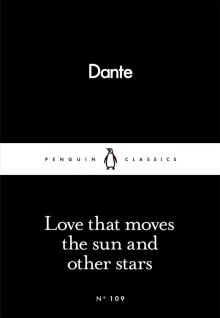 Love That Moves the Sun and Other Stars
Love That Moves the Sun and Other Stars The Divine Comedy
The Divine Comedy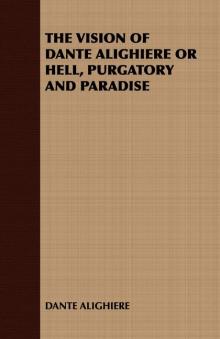 The Vision of Dante Alighiere or Hell, Purgatory and Paradise
The Vision of Dante Alighiere or Hell, Purgatory and Paradise Purgatory
Purgatory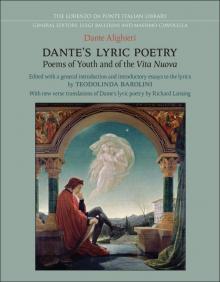 Dante's Lyric Poems (Italian Poetry in Translation)
Dante's Lyric Poems (Italian Poetry in Translation)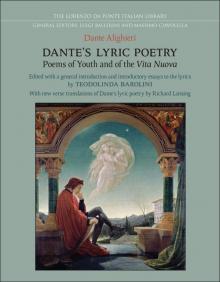 Dante's Lyric Poetry: Poems of Youth and of the 'Vita Nuova'
Dante's Lyric Poetry: Poems of Youth and of the 'Vita Nuova'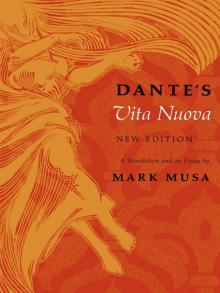 Dante’s Vita Nuova, New Edition: A Translation and an Essay
Dante’s Vita Nuova, New Edition: A Translation and an Essay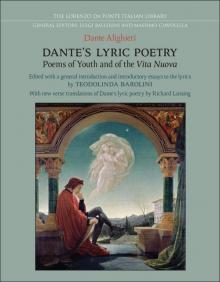 Dante's Lyric Poetry
Dante's Lyric Poetry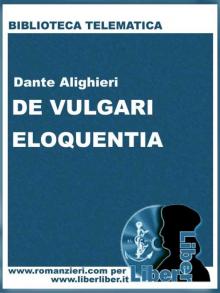 De vulgari eloquentia
De vulgari eloquentia The Inferno (Barnes & Noble Classics Series)
The Inferno (Barnes & Noble Classics Series)